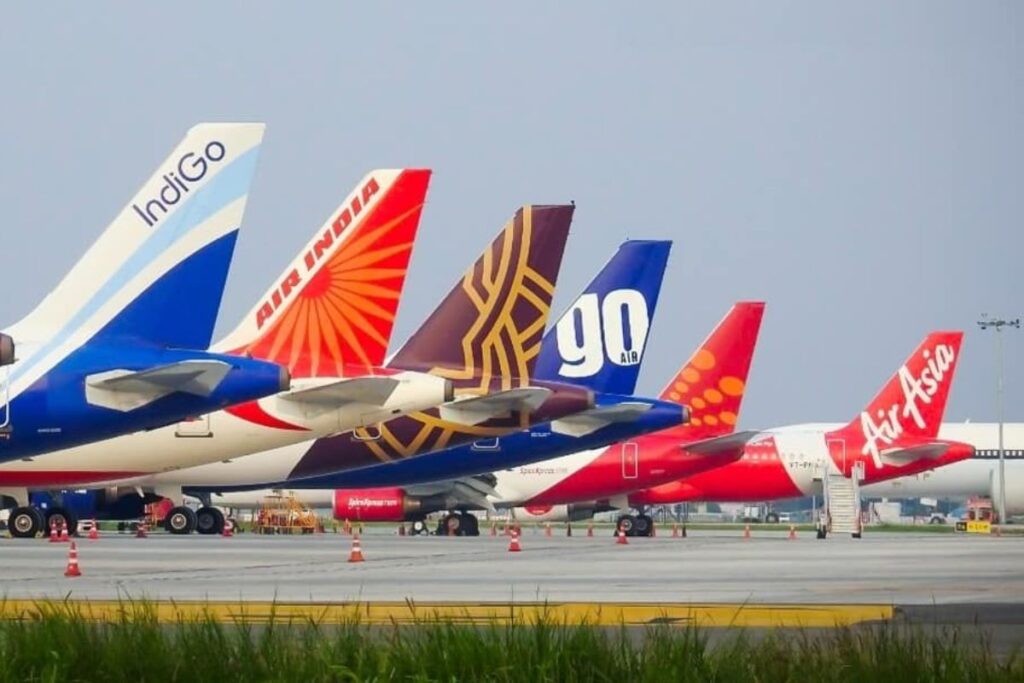From take-off to crash landing: A look at India’s private airlines’ turbulent history
Several private airlines in India have had a similar fate – they took off swiftly, only to eventually crash or be acquired by others. Some of the more prominent names include Chennai, NEPC Airlines, Damania Airways, Jet Airways, Kingfisher Airlines, Deccan Aviation, and Paramount Airways. Despite the setbacks, a few airlines have managed to continue flying.

Whether full-service or low-cost, the Indian private airline industry has seen many airlines fail due to financial troubles caused by a range of factors. It’s worth noting that several of these airlines were backed by well-known industrialists or industrial groups.
Go Airline (India) Limited is the latest carrier to face financial difficulties. The company cites Pratt & Whitney’s International Aero Engines as the main cause of its troubles. According to Go Airline, a growing number of faulty engines supplied by the company has forced the airline to ground 25 aircraft – which amounts to roughly 50% of its Airbus A320neo fleet – as of May 1, 2023.
Go Airlines (India) Limited, the third largest airline in India, has requested resolution under Section 10 of the Insolvency Bankruptcy Code (IBC) from the National Company Law Tribunal (NCLT) due to nearly 50% of its A320neo fleet being grounded. The airline claims that Pratt & Whitney, the exclusive engine supplier for its Airbus A320neo aircraft fleet, did not comply with an award granted by an emergency arbitrator appointed in accordance with the 2016 Arbitration Rules of the Singapore International Arbitration Centre (SIAC), which forced it to approach the NCLT. In addition, Go Airlines has filed a case against Pratt & Whitney in a US court, according to news reports.
Despite receiving an infusion of Rs 3,200 crore from its promoters in the last three years, with Rs 2,400 crore invested in the last 24 months and Rs 290 crore in April 2023 alone, the airline has decided to seek NCLT’s assistance. The airline claims that the total promoter investment in the airline since its inception is approximately Rs 6,500 crore.
According to the company, the Government of India’s Emergency Credit Line Guarantee Scheme has provided significant support to the airline. However, the grounding of almost half of its A320neo fleet due to the ongoing Pratt & Whitney engine failures has resulted in the airline incurring 100% of its operational costs while losing Rs 10,800 crore in revenue and additional expenses.
The airline has also paid Rs 5,657 crore to lessors over the last two years, with about Rs 1,600 crore going towards lease rent for non-operational grounded aircraft from funds provided by the promoters and the government’s Emergency Credit Line Guarantee Scheme. To recover these and other losses, Go Airlines has sought compensation of approximately Rs 8,000 crore in the SIAC arbitration.
Despite this, many airlines that have either soared or crashed were promoted by well-known industrialists or industrial groups. For example, Vijay Mallya promoted Kingfisher Airlines, while the Chennai-based NEPC Group, which had made significant profits from selling wind turbines, launched NEPC Airline. The NEPC Group also expanded into other sectors such as pharmaceuticals and textiles.
In 1993, after the Indian government deregulated the airline sector, S.K. Modi established ModiLuft as one of the earliest private airlines in the country. The airline formed a technical partnership with Germany’s Lufthansa. However, the collaboration did not last, and the airline ceased operations. SpiceJet later acquired its Air Operators Certificate.
G.R. Gopinath promoted Deccan Aviation, which played a significant role as a low-cost airline in India. It merged with Kingfisher Airlines, but the latter accumulated massive debt and losses, resulting in its closure in 2012.
Jet Airways, founded in 1993, was another leading airline in India. As new players entered the market, competition intensified, causing Jet Airways to incur losses. The airline ultimately ceased operations in 2019. Interestingly, the ownership of SpiceJet changed hands from Ajay Singh to Kalanidhi Maran and back to Singh.
Also Read: Indian Aviation News
Private & Non-scheduled Charter operators in India
Go through, the Mall of Aviation
For the best HELIPAD CONSULTANCY



